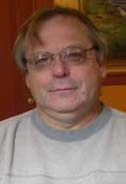
Dr. Steven F. Cronshaw
---------------------
materials from conferences
and other presentations
----------------------
The Need for a New Paradigm for Organizational Inquiry
Normal science in organization studies is modified logical positivism (MLP, a term used by George Alliger). If you can name it - using a noun – and provide a conceptual definition of it then the definiendum necessarily corresponds to something in the real world. Furthermore, that something is subject to observation, objective analysis, and quantification. In fact, this paradigm has generated a panoply of nominalized constructs for thinking about and conducting research on organizational phenomena. MLP is a conceptual universe where constructs spring up topsy anywhere and everywhere at the whim and fancy of academic researchers. Although attempts are made to study complex phenomena such as workplace adaptation using MLP, they are wholly inadequate to their task, resulting in desiccated and static formulations that cannot possibly do justice to the rich phenomena that they purport to study.
A number of parties have proposed alternatives to the academic messiness of MLP, including social constructionists, ethnologists, and symbolic interactionists. Although some of them are improvements on MLP, none have the virtuosity and range to yield a reasonably comprehensive understanding of workplace adaptation. Functional-perspectivism (FP) is the paradigmatic tool provided to make the first omnibus attempt at studying and understanding workplace adaptation. Many other organizational phenomena are explicable using FP assumptions, although these applications await further development..
A paradigm is comprised of a set of foundational assumptions underlying a given area of inquiry. A description of functional-perspectivist (FP) assumptions is found in presentations by Cronshaw and Cronshaw, Ong, Chung-Yan, and Chappell. Work on the fuller explication of FP paradigmatic assumptions is on-going. A formal logico-mathematical development of the FP paradigm, soon to appear in my book titled "A Theory of Workplace Adaptation", is presented in the technical appendix of Chapter 2.
Reference:
Alliger, G.M. (1992). The theory and structure of industrial/organizational psychology. In K. Kelly (Ed.), Issues, theory, and research in industrial/organizational psychology (pp. 3-27). Amsterdam: North-Holland.